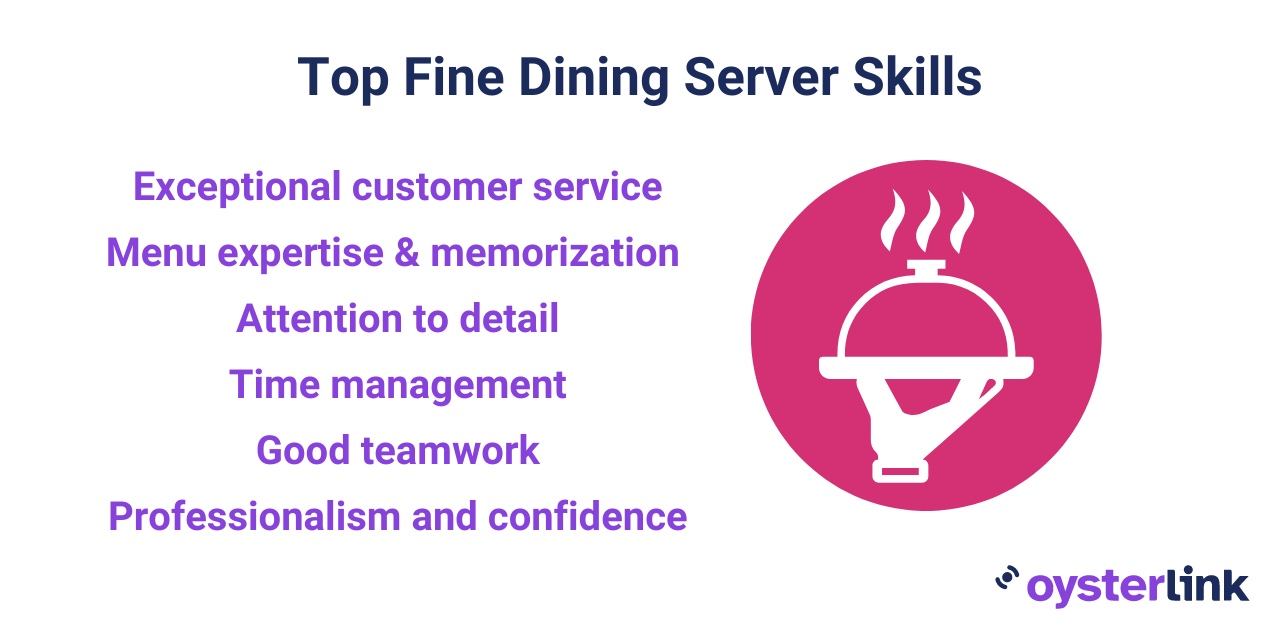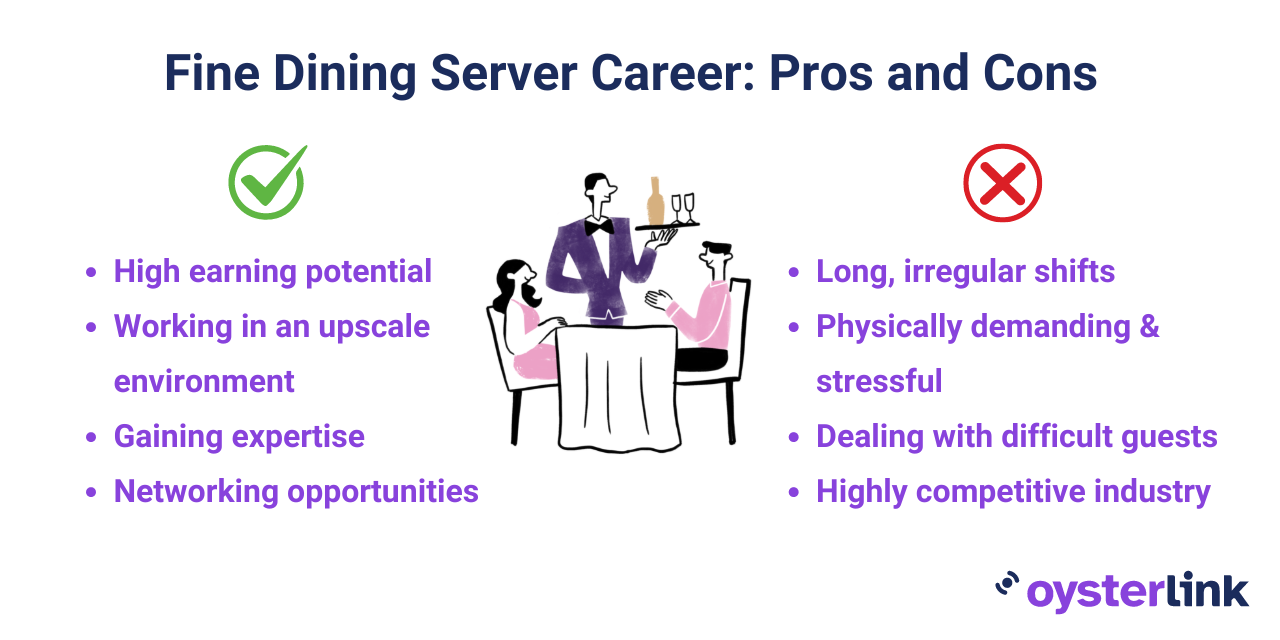Guide to a Fine Dining Server Career
Becoming a Fine Dining Server requires having a combination of knowledge and grace. You must know how to provide exceptional customer service by having specialized skills - like a deep understanding of the menu - while carrying yourself in a formal, professional manner.
The role is also a good stepping stone to more high-paying careers in the restaurant industry.
So, if you're interested in pursuing a career as a Fine Dining Server, this comprehensive guide outlines the essential skills, potential earnings and career paths to help you determine if this role is right for you.
What Is a Fine Dining Server?
A Fine Dining Server works in upscale restaurants, catering to a clientele that's often more sophisticated than those in other types of dining establishments. That said, Fine Dining Servers must memorize the menu and wine list so they can offer the best recommendations to such customers.
They work closely with both the front-of-house and kitchen staff to ensure a smooth service flow.
Fine Dining Servers are different from regular Servers. They blend more in the background and attend to guests unobtrusively.
Guests in fine dining restaurants expect an intimate and exclusive experience and a staff member who is overly present or intrusive can disrupt this mood.
Regular Servers, on the other hand, can be more interactive and have casual chitchats with the diners.
What Does a Fine Dining Server Do?
The key responsibilities of a Fine Dining Server include:
- Discussing the menu in detail, including ingredients and preparation methods
- Taking food and beverage orders
- Recommending wines or other beverages based on guests' preferences and food choices
- Ensuring proper plating and presentation before serving the dishes
- Providing attentive service to diners and anticipating their needs
- Handling guest complaints or issues promptly and professionally
- Performing other tasks, such as cleaning tables, refilling supplies and guiding guests to their tables if the Host/ Hostess is busy
Read more about a Fine Dining Server's duties and responsibilities on the Job Description page.
Skills and Qualities that Every Fine Dining Server Should Have
A successful Fine Dining Server acts as the face of the restaurant; your main task is to create an enjoyable, top-notch dining experience for every guest.

Here are some of the most important skills and qualities you need to perform well in this role:
Exceptional customer service
Fine Dining Servers provide a more personalized level of customer service compared to regular waitstaff. This is because guests in fine dining establishments often have stricter standards for the service they'll receive, given that they're paying more.
As such, Fine Dining Servers must also know how to handle requests or complaints gracefully and provide solutions without compromising the restaurant's protocols.
Menu expertise and memorization skills
Fine Dining Servers work in restaurants that offer highly specialized menus curated by an Executive Chef and often complemented by a Sommelier's wine selection.
You must have an in-depth knowledge of the menu, wine list and spirits so you can accurately describe each item, recommend pairings and answer inquiries confidently. Guests would trust your recommendation, so you wouldn't want to disappoint them.
Memorization skills play an important part when it comes to fully understanding the restaurant's offerings. Your goal is to know about each dish and beverage as if you're also a Chef or a Sommelier.
Attention to detail
Attention to detail is crucial for Fine Dining Servers; it differentiates a memorable dining experience from an ordinary one.
Everything must be done precisely, from table settings and the quality of every piece of tableware to delivering the orders.
Fine Dining Servers must also anticipate guests' needs and handle details flawlessly to maintain high standards.
Time management
You'll be working in a fast-paced environment and likely juggle multiple sets of guests, each with different needs and expectations. Effective time management ensures efficient service and prevents delays that can frustrate guests.
By effectively prioritizing tasks and anticipating customer requests, Fine Dining Servers can maintain a consistent flow - delivering a high-quality dining experience from start to finish.
Good teamwork
Seamless collaboration with the Chefs, fellow Servers and other staff will ensure that orders arrive promptly, drinks are refilled as needed and guest requests are fulfilled efficiently.
The Fine Dining Server is part of a cohesive team that creates a harmonious dining experience where every detail is attended to.
Professionalism and confidence
Professionalism and service standards should be evident in a Fine Dining Server's interactions with guests.
Fine Dining Servers are expected to project expertise by speaking clearly and confidently when talking to guests.
They must also maintain a polished appearance by wearing a clean, ironed uniform and adhering to other grooming standards.
Finally, they must exhibit excellent manners by addressing guest concerns politely and professionally.
If you need more guidance, this video offers practical tips and firsthand experience from someone who transitioned from a regular Server to a Fine Dining Server.
Fine Dining Server Wage and Earning Potential
In the United States, Fine Dining Servers earn an average of $27.20 per hour or $4,714.63 per month.
They have the potential to earn high wages, as they often work in high-end restaurants that have a bigger budget for staff.
Additionally, they are more likely to get generous tips that would significantly boost their earnings. After all, guests in fine dining establishments tend to spend more, leading to larger tip amounts for Fine Dining Servers.
It's important to note, however, that a Fine Dining Server's earnings can vary depending on their geographic location, the restaurant's success and their individual performance.
Compare the average salaries in different states below, you can sort them from highest to lowest or vice versa.
What Is the Workplace of a Fine Dining Server Like?
Fine dining restaurants have a formal setting - providing a higher level of attention to detail and etiquette and an upscale dining atmosphere for guests.
But behind the polished ambience, a Fine Dining Server's work environment can be highly demanding as they may need to attend to multiple tables simultaneously.
This is why a smooth coordination with the kitchen staff is crucial to deliver multiple courses without delay and prepared according to the diners' preferences.
From meticulous service to artistic food presentation, every detail must be perfect to provide an extraordinary dining experience that guests look forward to.
As with any type of restaurant, unexpected requests or issues may arise. So, it's up to Fine Dining Servers to ensure that these don't affect the customers' dining experience.
How to Become a Fine Dining Server
The first step to becoming a Fine Dining Server is to gain experience in the food service industry.
Working as a Server in a casual dining establishment can provide you with foundational knowledge and skills. This includes basic food service operations, interacting with customers and multitasking.
After getting some experience, seek employment at a mid-range restaurant, which will then expose you to a more refined dining environment. Here, you can develop your table setting skills and knowledge of wine and more types of dishes.
A strong foundation in these areas will help make the transition to fine dining smoother.
Finally, working as a Fine Dining Server requires continuous learning. You must stay updated on the latest culinary trends and learn more about wine regions and fine dining etiquette. Take all the training available to you to enhance your expertise and skills.
You can also consider taking introductory courses about wine and fine dining service. These could help you stand out from other candidates when you apply for jobs.
Fine Dining Server Career Progression
Becoming a Fine Dining Server is hard work, but it can open doors to new opportunities and higher-level positions within the restaurant industry.
You can advance to management roles, starting with Assistant Restaurant Manager, then advancing to Restaurant Manager and, ultimately, Director of Restaurant Operations.
Each role progression provides opportunities to expand on the knowledge and skills gained in previous positions - building your leadership capabilities and operational expertise.
Pros and Cons of Being a Fine Dining Server
A Fine Dining Server is a rewarding job and can lead to higher-paying roles. But like any other career, it has its pros and cons. Here's what you need to know:

The Pros:
- High earning potential (especially compared to other non-managerial front-of-house roles) from competitive base wages and generous tips
- Working in upscale environments and elegant settings
- Opportunity to gain expertise in gourmet food, wine, service etiquette and other specialized skills
- Networking opportunities with influential people (whether it's guests you serve or the Executive Chef) and building valuable connections
The Cons:
- Long and irregular shifts, including evenings, weekends and holidays.
- Standing for long periods, carrying heavy trays and multitasking
- Dealing with demanding guests while maintaining impeccable service
- High competition for positions in fine dining restaurants that might make landing a job challenging